http://edition.cnn.com/2017/09/21/asia/myanmar-military-the-real-power/index.html?sr=fbCNN092217myanmar-military-the-real-power0925AMVODtop
Leader breaks silence on Rohingya crisis
Myanmar's military: The power Aung San Suu Kyi can't control

JUST WATCHED
Leader breaks silence on Rohingya crisis
MUST WATCH
Leader breaks silence on Rohingya crisis 03:11
Story highlights
- Power over the military rests with the commander-in-chief who has complete control over Myanmar's security and police forces
- Military has been at the helm of "clearance operations" in Rakhine state, sending hundreds of thousands of Rohingya Muslims fleeing
(CNN)She's
been the focus of the world's criticism, scrutiny and censure as
hundreds of thousands of Rohingya Muslims seek refuge in neighboring
Bangladesh, escaping what the United Nations human rights chief has
labeled a "textbook example of ethnic cleansing."
But
analysts say Aung San Suu Kyi, the de facto leader of Myanmar and a
Nobel Peace Prize winner, has little if any control over the country's
military forces that are enacting the brutal campaign against the
Rohingya.
Since
August 25, when Rohingya insurgents attacked 30 police posts, killing
12 police officers, according to Myanmar state media, the military and
its surrogates have cut a swathe through Rakhine State, targeting
Rohingya Muslims in "clearance operations."
Rohingya who've fled have spoken of their homes being torched, of neighbors turning on neighbors, of relatives taken away never to be seen again.
The
military junta, which ruled the country with an iron fist from 1962
until 2011 -- arresting democracy advocates including Suu Kyi, imposing
martial law and killing protestors -- still controls the security
forces, the police and key cabinet positions in the government. And
there's nothing Suu Kyi can do about it.
"Under
the Constitution the commander-in-chief (of Myanmar's Armed Forces) is
his own boss, he doesn't report to Aung San Suu Kyi. He can't be fired,"
said Aaron Connelly, a research fellow in the East Asia Program at the
Lowy Institute in Sydney.
"If the
military has to choose between control and international respect, they
will choose control. It's a question of how much they're willing to give
up. We haven't seen much evidence that they're willing to give up
anything beyond what they gave up in the 2008 constitution," he told
CNN.
Still wielding control
In 2008 a new Constitution allocated a quarter of the seats in parliament to the military.
It was the military's way of easing Myanmar's return from exile as a
pariah state: constitutional reform, civilian government, and the
restoring of Suu Kyi to public life. But also enshrined in the
Constitution is the ability for the military to flex its muscle when it
senses that those newfound freedoms might encroach on its hold over
defense in Myanmar.
Among
the edicts in the document is the condition that no one with
dual-citizen relations (including parents or children) can ever be
president. Because both of Suu Kyi's adult sons are British citizens, as
was her late husband, she was unable to assume the presidency. However,
she is able to still largely play that role in a position that was
created especially for her, State Counselor. During the 2015 elections
she told a news conference that should her party win and form the
government "I will be above the president. It's a very simple message."
In
the Constitution, the role of the commander-in-chief -- who is the
ultimate military authority. -- often overrides that of the President.
Along with nominating military candidates for seats in both houses of
parliament, the Constitution also allows the commander-in-chief, in the
event of a state of emergency "the right to take over and exercise State
sovereign power." The constitution also bans "retrospective" penal law
-- an addition possibly meant to prevent the military from being
prosecuted for past crimes, including the house arrest of Suu Kyi and
the junta's disavowal of the 1990 elections that would have effectively
routed the generals from power.
When she addressed diplomats in Myanmar on September 19, Suu Kyi stressed that her government was still young -- in power for a mere 18 months -- and efforts to bring democracy to the country were still fledgling.
"After
half a century or more of authoritarian rule, now we are in the process
of nurturing our nation," she said. "We are a young and fragile country
facing many problems, but we have to cope with them all. We cannot just
concentrate on the few."
The
internationally-feted democracy advocate has had to endure the howls of
outrage from around the world at the military's treatment of the
Rohingya. For her military counterpart, Commander-in-Chief Sen. General
Min Aung Hlaing, on the other hand, it's been business as usual.
While
Suu Kyi chose to cancel a trip to the US to speak at the United Nations
General Assembly to deal with the problems at home, Min Aung Hlaing has
been hosting foreign diplomats, speaking to military audiences and
receiving donations to a fund for people displaced by the "chaos"
instigated by Rohingya insurgents.
His formal engagements are posted almost daily to his verified Facebook page, to more than 1.28 million followers.
A prolific Facebook account
On September 15, 2017 a post written in English quoted Min Aung Hlaing
saying there had been 93 clashes with "extremist Bengalis" since August
25. The militants, the post claimed, intend to build a stronghold in a
district in Rakhine State. "They have demanded recognition as Rohingya,
which has never been an ethnic group in Myanmar. Bengali issue is a
national cause and we need to be united in establishing the truth."
Earlier, on September 1, 2017, another post in English harkens back to the loss of "Rakhine ethnics"
of Rakhine State in 1942, "in which Bengalis attacked, murdered and
coerced them into leaving their homes. We will never let such a terrible
occurrence happen again."
Both
Suu Kyi and the military have said the violence in Rakhine State, which
prompted the mass exodus of nearly half a million people, was
instigated by Rohingya militants.
As
well as refusing to publicly refer to the name Rohingya, Suu Kyi
insists the violence and the displacement has affected many other people
too.
There is long-held prejudice against the Rohingya among the people of Myanmar. Some Rohingya were originally brought in as laborers under British rule
from 1824 to 1948 in what the British considered an internal migration
because the area was part of British-administered India. Many Rohingya,
however, say they are descendants of Muslim traders who can be traced
back to the ninth century. In reality, there is likely to be a mix of
ethnicities among them.
When the
government of Myanmar passed a citizenship law in 1982, it said Rohingya
could apply if they spoke an officially recognized language and could
prove that their families had lived in the country before independence.
But most Rohingya were never granted the paperwork to prove their roots
and are effectively stateless. They did not make the list of the 135
recognized ethnicities in Myanmar. In his public statements Min Aung
Hlaing doesn't refer to Rohingya by that name, using instead the term
"Bengali."
Arms sales and weapons embargos
The
military has avoided condemnation from Western nations precisely
because it is still wending its way out of isolation. For decades,
countries like the US had limited diplomacy with Myanmar, assigning
defense attaches instead of ambassadors to the US embassy and attempting
to maintain contact while trying not to be tainted by the military's
disregard for human rights.
Under
the Obama administration the military relationship between the two
countries focused largely on training the military in rule of law, human
rights and disaster relief, with the occasional participation in
multilateral exercises -- nothing the military would be too concerned to
lose, said Aaron Connelly at the Lowy Institute.
"We
never got to the point where those relationships existed and so because
we never got there, we don't have the leverage over the military to be
able to say, by cutting off our relationship with you we can make you an
international pariah. We never developed the carrots and now all we're
really left with are sticks," he said.
There
are still US and EU arms embargoes against Myanmar, but it continues to
receive weapons and training from allies including China, India, Russia
and even Israel.
"It's very murky,
it's one of the least transparent countries in Asia when it comes to
these things," said Siemon Wezeman, a senior researcher on arms and
military spending at the Stockholm International Peace Research
Institute.
"Looking
at all the different sources you get a picture of China being by far
the most important supplier. The weapons we see showing up, the bigger
ones, are Chinese, all land, air and seacraft."
Russia,
he says, supplies helicopters and light aircraft, India supplies
weapons to Myanmar's navy and despite the EU ban, some European
equipment makes it through Wezeman said, although not with the blessing
of those countries.
"It's indirect.
It's mainly engines, sometimes it's for Chinese ships that end up in
Myanmar. They're produced under license in China but they're supposed to
inform the European countries," he said, adding that the engines may
not be considered to be weapons.
"When India supplied equipment to Myanmar including radar, some of those radars were based on a Dutch design.
The Dutch made it very clear that if there was Dutch technology and
Dutch components that India was breaking any agreements it had because
those things were considered weapons." The Indians, he said, responded
that they were all Indian-made.
The business of war
Defense spending makes up 14% of Myanmar's budget, which even includes arts funding for propaganda projects.
But even during its economic and political isolation Myanmar was able
to buy weapons and hardware because of the controlling interest the
ruling junta had in several government monopolies.
Some of their business properties include Myanmar Economic Corporation, which maintains holdings in manufacturing, telecommunication, transport and even gin. Myanmar Economic Holdings Limited brings the ruling generals lucrative returns on cigarette and petroleum imports.
The
generals "insert themselves in various parts of the economy and use
this to enrich their shareholders," said Yeshua Moser-Puangsuwan, a
contributor to a 2015 Transparency International report on Myanmar,
quoted in the Financial Times. "Despite the political changes in
Myanmar, the military remains solidly in control, and its books are
still closed to public scrutiny."
World leaders are now being urged to implement sanctions against the military itself,
to try to push the ruling officers to end their campaign against the
Rohingya. Sen. John McCain said he plans to remove language from a
defense authorization bill that would have expanded training exercises
between the US military and Myanmar's.
"While I had hoped the NDAA (National Defense Authorization Act) could contribute to positive reform in Burma," McCain said in his statement,
"I can no longer support expanding military-to-military cooperation
given the worsening humanitarian crisis and human rights crackdown
against the Rohingya people, and will seek to remove this language when
the Senate begins debating the NDAA."
Australia's government, which pledged more than $53 million ($66 million Australian) in aid for Myanmar in 2017-2018,
has said its agreement with Myanmar was aimed at helping the country's
transition to a democracy. The UK said it would suspend its training
program for the military because of the violence in Rakhine State "until
there is an acceptable resolution to the current situation," a
spokesman for the British government said on Tuesday. The UK government
called on Myanmar's military to "take immediate steps to stop the
violence in Rakhine and ensure the protection of all civilians, to allow
full access for humanitarian aid." Five military trainee officers
attending courses in the UK were being sent back to Myanmar, the
country's military information office posted on its official Facebook page.
They were being "forced to return" after the UK suspended the program,
the post said. The military would be bringing them home as quickly as
possible, adding that "no trainees," including those who sent under
previous agreements with the UK, "will be sent to Britain anymore."
No weapons embargo for countries like Israel
Because
Myanmar is subject to a weapons embargo from the European Union and the
United States, it has turned to other suppliers including India and
Israel for its needs, amid a push to become less reliant on China, wrote Myanmar expert Andrew Selth.
In Israel, human rights activists have petitioned the Israeli High Court to halt sales
of military weapons and equipment to Myanmar. Eitay Mack, the lawyer
presenting the petition said that Israel has been opaque over the nature
of its longstanding relationship with Myanmar, but the internet has
provided his legal team with significant information that is public and
hard for Israel to ignore.
"Israel
could be considered as compliant in crimes against humanity, it's enough
that Israel knows that this is happening and the weapons and training
it sends to Myanmar could be used for its crimes," Mack told CNN.
Sen.
General Min Aung Hlaing visited Israel in 2015, toured military and
naval bases, and published everything on his Facebook page, Mack said.
"It was secret in Israel but then I found it on Facebook. It's a public
thing and hard for them to argue."
During the 2015 visit the Myanmar generals "disclosed that they had purchased Super Dvora patrol boats from Israel, and there was talk of additional purchases," an article in Israel's Ha'aretz noted.
Min Aung Hlaing's proclivity for posting on Facebook revealed visits to Myanmar by Michel Ben Baruch, the head of Sibat, Israel's defense export unit. Israeli company TAR Ideal Concepts, whose leadership includes a former head of the Israeli police, had published advertisements, Mack said, that included images of forces undergoing training. The post is titled "special weapons systems in Asia," but the flag of Myanmar is visible in one of the images.
Asked
for comment about the lawsuit and the state of sales to Myanmar, the
Israeli Foreign Affairs Ministry told CNN: "Israel denies categorically
the false information in the media regarding a so called involvement in
the tragedy in the Rakhine province in Myanmar." The Israeli defense
ministry said it "does not comment on matters relating to defense
exports."
What the military wants
Longtime
Myanmar observer Andrew Selth says the military does not want to run
Myanmar, but it does intend to protect its people and its position in
the country. Its nationalism will "be cited to justify military operations against ethnic armed groups and, if considered necessary, the Rohingya," he writes.
What
should be of great concern for Myanmar, says Selth, is the possibility
that people within the armed forces want to "slow down the reform
process or to preserve certain perks and privileges."
The
older officers grew wealthy through the military's control over the
government, and "it has been suggested, for example, that some younger
officers resent the fact that current and proposed changes to Myanmar
society may deny them the opportunities for personal enrichment enjoyed
by their predecessors."
For as long
as experts can see, the military will remain the real power in Myanmar,
and there will be little Aung San Suu Kyi can do about it.












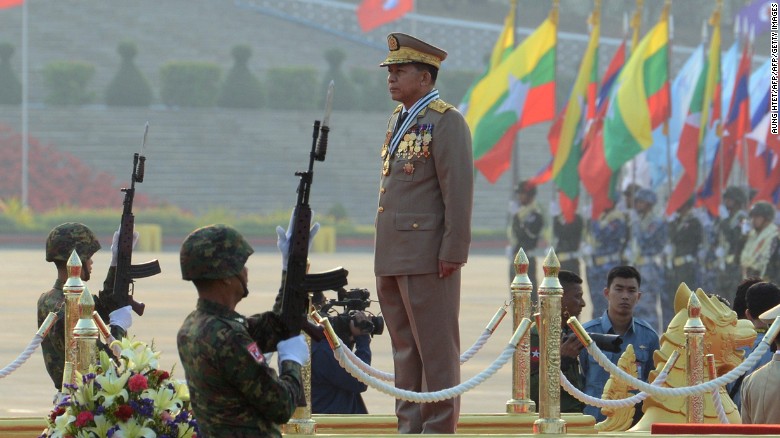
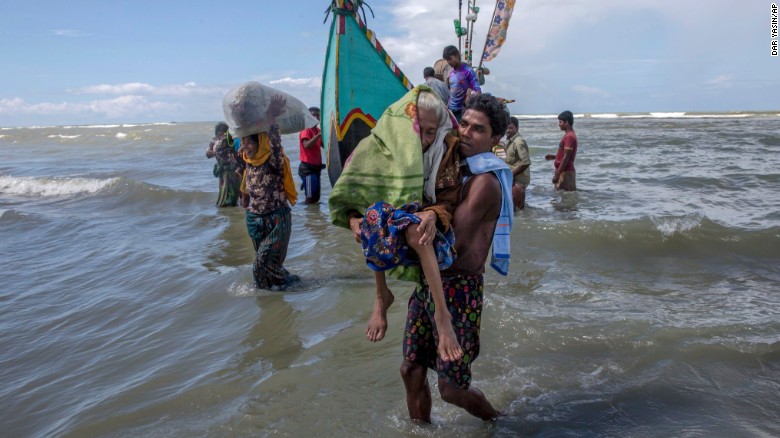
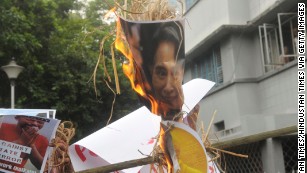
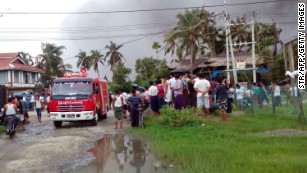
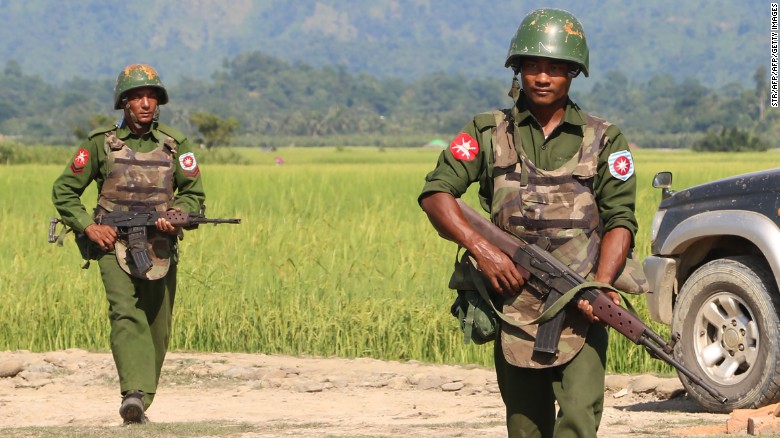
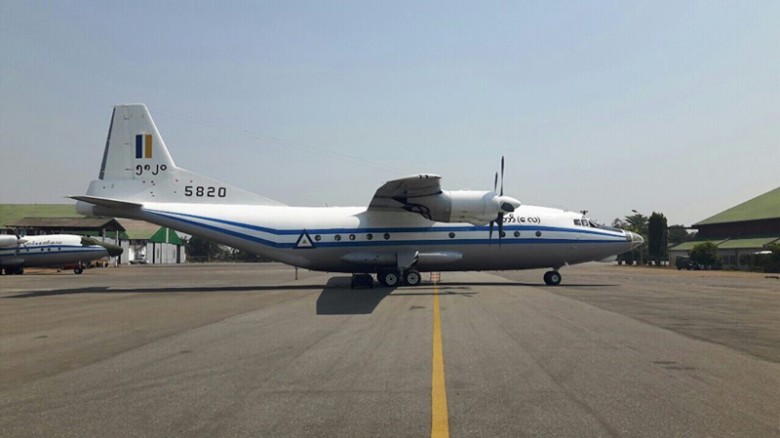





No comments:
Post a Comment